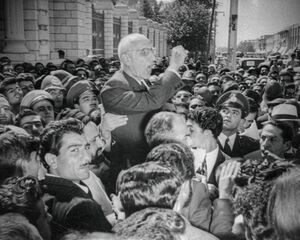1939 Motion of No Confidence
A motion of no confidence in the Saren government of Jose Ruiz was debated and voted in the House of Commons between 1 November and 4 November 2020. It was brought by Labour Party (SLP) leader Mohammad Salazar after the governing Conservative Party (NCP) was found to have entertained the sale of sovereign Saren territory for the purposes of maintaining peace with neighboring Slattsenw.
The motion gained the support of 357 members of the House of Commons, consisting of the entire Labour, Socialist, Aegyptian Independent League, Hispanic Voice, National Country and both Independents in the chamber. Prior to the vote it was believed that the National Country would serve as the swing votes, until two of it's members publicly announced support, making clear the motion would pass either way. On the morning of the result, 102 Conservative MPs were absent from the vote, leading to an overwhelming vote against the government, and the Conservatives spending almost a decade in opposition as a result of public backlash to the party.
Between the publication of the Epirusian Papers and the debate on the motion, mass demonstrations were held across the country, indicating public anger towards the government. Bastions of Conservative Governance expressed their fury with cut up party membership cards thrown at MPs offices, an estimated fifty thousand cards were thrown at the official party headquarters in Seira. Anger was particularly apparent in Hispania where the Conservative Senators came out against their own party, as did Conservative politicians local to the area.
Background
The Epirus summit was a scheduled summit between Saren and Slatsen high ranking diplomats. Originally announced in September of 1939, for December, it was intended to discuss a 'final treaty of peace and prosperity', announcement of the summit was seen as further appeasement and triggered mass demonstrations in Hispania, Aegyptus, Sinai and Abyssinia. Demonstrations increased in potency by the end of the month to include every major city. On October 14, an article was published by the Saren Post alleging the Foreign Secretary had positioned the government to entertain the notion of selling the Balearic Islands, Malta or Cyprus to the Slatsens in pursuit of peace. A second article in the Seria Teleraph appeared a day later declaring the Prime Minister, Jose Ruiz had vetoed the former two and supported exploration of partitioning or demilitarizing Cyprus.
On October 17, three cabinet secretaries resigned and the Opposition Leader tabled a motion of no confidence. Parliament was not scheduled to sit for a full week, and the following week would see further fracturing among the minority government of Jose Ruiz. Socialist leader Leonna Paris supported the no confidence motion, as did all four members of the Aegyptian Independence League. The movers were thus four votes short of the necessary tally to bring down the government.
March on Centennial Bridge
Further public demonstrations were held until the March on Centennial Bridge, on October 28. The marchers were joined by Opposition MPs and the crowd of roughly 500,000 eventually crossed onto the bridge, cutting off Parliamentarians on Parliament Island from the use of the bridge. As the bridge was the only bridge offering a way off the Island, security concerns were had over whether or not the protests amounted to a 'siege'.
